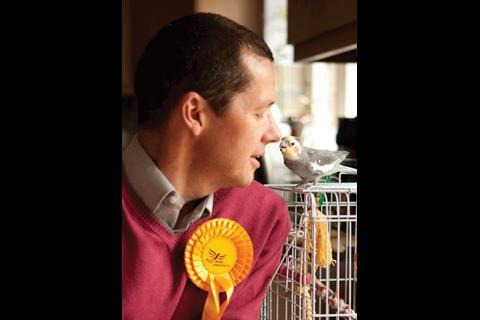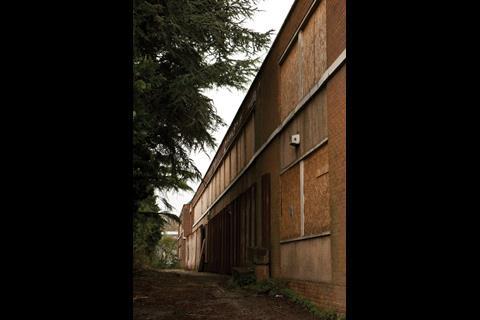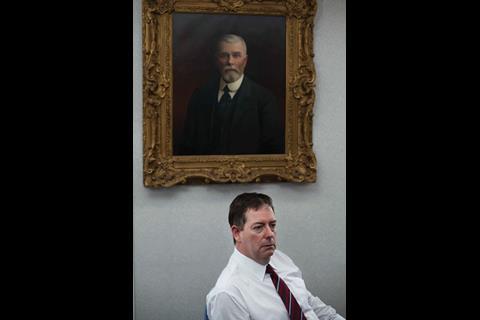Roxane McMeeken went to a Derbyshire constituency where construction has a big say, and a bigger stake, in the result. So how much do the candidates know and care about their votersâ fears?
From the window of the taxi, Dronfield looks like an ordinary northern town: lots of grim, pebble-dashed council estates ameliorated by pretty stone cottages and the odd double-garaged executive home. It is part of the Derbyshire North East constituency, and although the mines have closed, their legacy to Labour is a safe seat; it will take a swing of about 11% for the Conservatives or the Lib Dems to take it. And if either do, the construction industry will have played a big part: according to consultancy Madano it provides above average employment.
The industry also has more to lose from the policies of the incoming government here than most other areas of the country. What we are hoping to find out is just how much â and how much the candidates know about it.
Whatâs at stake
To begin answering the first question we travel to the industrial estate of Callywhite Lane, to meet Gerald Swift, the 60-year-old owner of a family building business and a swing voter. We cram into his tiny office, accept mugs of tea and perch amid the piles of invoices covering his desk and pinned to walls. âWeâre an old fashioned village builder and we can do any type of work, but the fact is that 90% of it is from the public sector, the vast majority from primary schools and we have no idea if schools work will be stopped. None of the parties have said what theyâll do in this area.â In short, 90% of Swiftâs ÂŁ2m turnover is at the mercy of the next government.
Swiftâs position demonstrates the importance of the first aim of șÚ¶ŽÉçÇűâs Charter 284 campaign: to complete the renewal of Englandâs schools estate. Equally, Swiftâs business could directly benefit from government meeting other demands, such as encouraging the development of renewable energy. Indeed, a wind farm is being planned for the constituency. Swift says: âWeâd happily work in the energy sector.â
So far, Swift has spent the recession in steady profit and none of its 15 staff have been laid off, living proof of the ability of state spending to stimulate demand and protect fortunate firms from the worst of the economic weather. Without it, the future looks inhospitable. âWe know of firms undercutting our bids by 80%, and the disgusting thing is that clients are employing them, knowing that the firms canât afford it.â Meanwhile, âour workload is fine for the next three months but I really donât know whatâll happen then.â
Swift, whose grandfather founded the firm 50 years ago, meets doubt with stoicism: âIâve lived through seven recessions and have had entire business streams wiped out before and survived.â But he admits that what he really needs before he votes on 6 May, is some indication of which parties will cut what areas of public spending. In particular, heâd like to see a commitment to encouraging housebuilding to divert the competition from his turf.
So what impression have the three main candidates made on him? Very little, is the answer. âI donât know even know who the Tory is. I know the Labour one [Natascha Engel, who weâll be meeting later]. She was involved in the expenses scandal and the Lib Dems put a leaflet through my door.â
Who will he vote for? âMy father was a Labour councillor but my mum was as blue as you can be, and Iâve voted for all three parties so I could go any way.â He says he accepts cuts must be made and he also believes none of the three parties would cut spending entirely on healthcare and education. But he wants to know which of them âreally wants to help the building industryâ, and at the moment that is unclear.
Further up Callywhite we drop in on Simon Carr, managing director of ÂŁ200m regional contractor and developer Henry Boot plc. Despite its larger size, the 150-year-old family firm faces similar issues to Swift, with up to 85% of its construction turnover coming from the public sector. It recorded a pre-tax loss of ÂŁ11.9m for the year to December 2009 â although this was the result of property writedowns rather construction work. It had to make more than 100 staff redundant in the past year, 20% of its payroll, after several frameworks, including some under the Decent Homes programmes, came to an end.
Carr says the firmâs future depends on the the policy choices of the next government. He says: âI agree wholeheartedly with Charter 284. Cutting construction spending may save money but in the long term it hits GDP and removes the social good done by improving schools and homes.â
Like Swift, however, heâs in the dark on which of the three main parties are going to cut what where. âAll three have unanswered questions. They talk about protecting health and education but they are not specific. Nobody know whatâs going to happen.â
Carr is also upset about Labourâs plan to raise National Insurance by 1%. âItâs not exactly helpful when youâre trying as hard as you can to drive down every single cost. It will hit profit and our ability to create jobs.â He adds that his message to politicians would be: âDonât forget about our industry, weâre a wealth generator.â
What do they care?
We decided to find out whether the three main candidates know about their votersâ worries. Before our trip to Dronfield, we call Huw Merriman, the Toryâs man in the Peak District. He declines to meet us but cushions the blow with the offer of a chat on the phone; heâs polite, but able to contain his eagerness to address the construction agenda.
Next, we call Richard Bull, the Lib Dem hopeful, who besides being a GP is chairman of property developer Glenvale. Surely heâll want to meet us. After a long conversation he reluctantly invites us to his minimalist new house in Dronfield.
Sitting around the kitchen table, with the party manifesto lying on it and his cockatiel, Smoky, offering occasional chirrups from his cage, Bull says heâs noticed a change on the doorsteps since the first leadersâ debate. âThe atmosphere has changed massively. People are actually interested.â
But is he interested in construction? âWe want 250,000 derelict houses brought back into play. In Derbyshire North East that could be ⊠well, divide 250,000 by 635 seats. It would have an impact, certainly.â
What about the regulatory burden on housebuilding? âIt may need to improve; Iâm not an expert in this area.â But doesnât he run a housebuilder/developer. âMy guess is that â and Iâve not Googled this â but I would imagine we would be looking to enforce things that are not to do with red tape.â
How about making the planning system more efficient? âThrough devolution we would have more planning decisions taken at a local level and we would give people the right to appeal planning permissions.â That seems an odd stance for a developer. âIt could harm our company but developers must be in harmony with the areas where they build. If locals donât benefit, whatâs the point?â
Would the constituencyâs school building programmes continue under a Lib Dem regime? Bull throws his right arm across his chest, gripping his left elbow. âI donât know but I would imagine the programme here would continue â but weâre looking to fund it through something other than PFI. Iâd imagine weâll still build schools whoever is in power âŠâ He begins feverishly flicking through the manifesto in front of him. After about three-and-a-half minutes he looks up. âNothing in our manifesto suggests we would cut back on the schools programme.â
Healthcare spending would be âmaintained I thinkâ. Does that include capital spending? âIâd have to check.â More flicking. âThereâs nothing in the manifesto on it.â
Bull does say that the constituency is âdesperately in need of extensions to GPsâ premisesâ. If elected, would he support that then? âItâs not something Iâd push because we want elected health boards to replace primary care trusts, and theyâd make the decisions on building work.â He does at least support the wind farm planned for Matlock Moor. Still, it doesnât quite feel like weâve met constructionâs candidate yet.
Perhaps Engel will offer more hope. In contrast to Bullâs home, her rambling stone house is strewn with toys, bulging bin liners and trails of sand. Against the distracting backdrop of her kitchen wall, upon which her three children appear to have sated their creative urges with a hell of a lot of paint, Engel says earnestly: âI care deeply about construction. I have a trade union background and Iâve worked closely with Ucatt.â She reels off a range of issues to prove that she knows what constructionâs about: health and safety, pleural plaques, bogus self-employment and the Corporate Manslaughter Act (which she worked on).
She goes on: âLabour has specifically identified construction as an industry we want to help.â Does this mean the school building programme is safe? âWe canât give cast-iron guarantees but the commitment is there.â Engel is also lobbying to get Decent Homes money for the area. âWe want to use the money to invest in more affordable housing, even if we donât get the full amount.â
She is against the wind farm, however. âWeâre talking about five massive wind turbines in an area where people have moved because its quiet and out of the way and Iâm not entirely convinced we need it â weâre already ahead of our renewables targets. Iâm in favour of wind farms in principle, however, just not this one.â
What about the NI rise troubling firms like Henry Boot? âI donât have an answer. People are asking me on the doorsteps but I have to swot up on it.â She offers to get back to us the following day, and after some chasing she says: âThe NI rise will create ÂŁ7bn a year. Given the choice between that and VAT Iâd go for NI because itâs fairer: it takes relatively little whereas a VAT rise would hit the poor.â
Once we have the full picture, from Engel, we reckon that of the three candidates she has made the strongest case, but none of the candidates has been wildly encouraging. The last person we meet in Dronfield is a builder who was laid off five months ago by regional contractor Harrison Construction. He says heâd sack all the main parties. He plans to vote BNP.

Election 2010 - week three
âWhat a difference a debate makes.â These were the words of one of șÚ¶ŽÉçÇűâs floating voters after the first of the leadersâ clashes. He was the same voter who told us last week that he would not vote Lib Dem as Nick Clegg had the leadership skills of a blancmange. This week? He is torn between Labour and Lib Dem, writes Emily Wright.
It is telling that Cleggâs greatest competition for the mediaâs attention over the last week came from the Eyjafjallajökull volcano rather than his rivals. Some argued that the surge of popularity was caused by hype and the fact that he had a clean slate, never having started a war, overseen the collapse of capitalism, reintroduced the poll tax (or, truth be told, done anything else of much interest).
The BBCâs tracker poll showed that support for the Lib Dems shot up from 20% on 15 April (debate day) to 30% five days later. Support on șÚ¶ŽÉçÇűâs online poll went from 12% last week to 27%. And the yellow surge didnât stop there. A contact in New York revealed last Friday that Cleggâs celebrity status had gone stateside, creating a sudden interest in who âthat Nickâ was.
What all this means in terms of bums on green leather in the next House of Commons is unclear: the Tories, unable to attack Clegg directly in case they sounded like the Nasty party again, were reduced to claiming that a vote for him was in reality a vote for Gordon Brown (whom they could attack to their heartsâ content). But in the interim, a point that all five of our floating voters have made is that, post debate, the Lib Dems appear to have the manifesto that says the most about what theyâre going to do if they gain power. The hope is that this will put pressure on Labour and the Conservatives to provide more detailed guidance on where the public sector cuts will be coming from â which is something that Vinci, Galliford Try and Wates, among others, have been shouting for.
So far, it is the Liberal Democrats who have taken the keenest interest in our Charter 284 campaign. Last issue, Clegg wrote an open letter to șÚ¶ŽÉçÇű readers endorsing the campaign and outlining how the party would address each of its key aims if they were to come into power. In it he pledged, among other things, that in its first year of office, the party would invest more than ÂŁ3bn in infrastructure, would set up a National Infrastructure Bank, and were committed to continuing investment in new school buildings.
This week, our thanks go to Gordon Brown, who has written us a response to Charter 284. There is much there of interest on Labourâs investment plans, but Vinci et al will scour it vain for news of spending cuts âŠ
Backtrack of the week
The Tories were forced to defend their position on Crossrail after a radio slip-up by a shadow minister this week. During an interview on LBC radio last Sunday. Justine Greening, the Conservative shadow minister for London, said she was unable to âguarantee that Crossrail will continueâ. The party was forced to do some damage control on Monday, making clear that they still support the project and that the comments do not represent a change in policy.
A Conservative spokesman said: âCrossrail is an important piece of infrastructure for London, the Conservative manifesto is very clear: we support Crossrail. Our position has not changed.â
What the floating voters say

Jack Pringle of Pringle Brandon
Last week he was maintaining a âlilt to the leftâ. Now, if he could vote for a hung parliament, he would.
What a difference a debate makes! I thought Nick Clegg came across very well. Previously Iâve always thought he looks like Vince Cableâs nephew or Harry Potter but suddenly he got into long trousers. I though he aced it in terms of presentation and policy. I donât think Brown came off as badly as the polls are saying â he was admirably aggressive. Cameron suffered the most, with pursed lips and looking as though he was troubled by some of the policy questioning.

Neil Dower, director of Conamar, Stevenage
Started with an open mind, last week was leaning towards the Tories, and now will âsit back and see what happensâ.
I watched the debate and took a bit of a step back from it. There was so much talk about it afterwards, mainly about how well the Lib Dems and Nick Clegg came across. I have to say I wasnât impressed by the debate at all, by anyone. It seemed very staged to me and all the hype afterwards was down to spin. It needed more substance. As for Clegg, he was very fortunate that Cameron and Brown kept on attacking each other, giving him the perfect opportunity to keep making a point at the right moment and rising above it all.

Chris Fennell, director of Curtins Consulting, Manchester
Started leaning towards Labour, then split between all three and now favouring the Lib Dems.
I am now leaning towards the Lib Dems which is a bit of a surprise to me. But I thought Nick Clegg has done well in the last week and his policies seem clearer than the othersâ. The manifestos are very unclear about what is actually going to be done. They are big on ideas and lacking in detail. But the Lib Dems do seem to be working harder at providing detail on how they will achieve their proposals, which is better than the others particularly the Conservatives. I thought Cameronâs performance during the debate was very non-committal and evasive. He gave no commitments at all in terms of what he is planning to do on spending.

Simon Flatt, managing director of Flatt Consulting, Surrey
Last week he said he would not vote Lib Dem. This week, itâs all change after the TV debate and he is leaning towards either Labour or the Lib Dems.
Well, Nick Clegg is back in the room. I was hugely critical of him last week but that changed after the debate. He did very well, as did Gordon Brown. But I thought Cameron looked shaky and a bit uncomfortable and he focused on criticising the othersâ policy rather than giving a detailed outline of his own. All three parties still need to crystallise what they are saying. My concern is with the deliverability of their proposals and at the moment I am not sure the Conservatives, in particular, are covering this in enough detail.

Paul Swinburn, director of Provelio, based in Bristol
Last week was favouring Labour and he still is.
I wasnât as impressed by Nick Clegg after the debate as the rest of the country. I donât think this surge in popularity will translate into votes.
But I do think Clegg may have put pressure on the others to put some facts and figures on spending cuts. I am still supporting Labour but I think Gordon performed as expected in the debate: not very well. He suffers from a charisma deficit. But I donât think thatâs a bad thing. We have had glossy leaders in the past who havenât always led us down the right road. I think we want a safe pair of hands, not a showbusiness personality.
Quote of the week
"This poll was trumpeted by HIPsâ last known supporters as an unequivocal indication that the market supports HIPs. We now know that, just like HIPs themselves, this research was fundamentally flawed right from the outset. Weâve been very consistent â HIPs would be history under a Conservative government. Experts and the market agree with us and we wonât be swayed by dodgy research or any amount of expensive lobbying from those with vested interests."
Grant Shapps, shadow housing minister, on the full research behind recent polling for the Association of Home Information Pack Providers (AHIPP), which was found to be flawed
Downloads
Constructionâs leanings
Image, Size 0 kb

































No comments yet